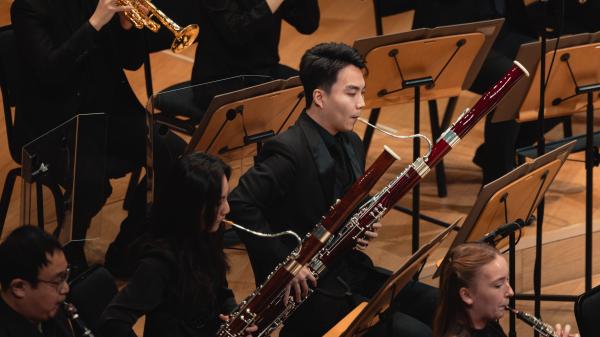The Tianjin Juilliard Graduate School Student Handbook ("Graduate Student Handbook") contains information on departmental, academic, personal and social development opportunities; clarifies values, standards and expectations for which the School holds all student community members accountable; and provides resources and support services for students to help establish strong foundations on which to build their professional career as an "artist as citizen." It is the expectation of The Tianjin Juilliard School that all students are responsible for reading and understanding the information within the Student Handbook, in addition to your rights and responsibilities as a Tianjin Juilliard community member.
All students will be notified of any addendum's or changes to the Graduate Student Handbook via Tianjin Juilliard e-mail.
The Tianjin Juilliard School (the “School”) strives to create a safe, comfortable, and professional environment that is conducive to the educational and personal well-being of all students. It is expected that all members of the School community, including without limitation School officials, employees, students, programs and organizations contribute to fostering such an environment. In doing so, it is important to always be aware of the rights and responsibilities held by each student.
The Tianjin Juilliard School Student Code of Conduct
The Tianjin Juilliard School Student Code of Conduct ("Code of Conduct") sets out the standards of conduct expected of its students, which supersedes all other School documents, and applies to all students enrolled at the School for their duration, without pause (including breaks and students on a leave of absence), until graduation from the School.
When students choose to accept admission to the School, they accept the rights and responsibilities of membership in the School’s academic and social community. As members of the School community, students are expected to uphold its values by maintaining a high standard of conduct.
Student misconduct is defined as any student behavior that violates rules of the School as stated in this document; contained within any School publication, or on the website; and/or is in violation of applicable laws, rules or regulations of the People’s Republic of China ("Applicable Laws").
Students who are present or accompanying others while in the act of violating the Code of Conduct may be deemed as culpable as the violators and may be subject to sanctions.
Occasionally, the rules of the School and the law will overlap, but the School does not attempt to duplicate the law or legal system. The School reserves the right to pursue matters through its student conduct system that may also be addressed in the legal system.
Serious violations or persistent minor violations of School rules, policies, or regulations may result in suspension or expulsion.
Non-residential students are expected to abide by the same standards of community behavior as residential students as outlined in the Code of Conduct.
The School reserves the right to adjudicate misconduct that occurs off campus or outside the main School Building and Residence Hall (“School premises”) if such misconduct becomes known to the School.
The Tianjin Juilliard School Conduct System
Standards of Fairness and Student Rights
1. Abuse of the Student Conduct System
2. Academic Misconduct and Dishonesty
3. Alcohol Violations
4. Building and Space Usage
5. Correspondence Policy
6. Drugs and Controlled Substances Violations
7. Falsification, Disruption, Non-Compliance
8. Fire Safety
9. Information Security and Governance Policy
10. Physical Harm, Harassment, and Sexual Misconduct
11. Smoking
12. Solicitation and Distribution Policy
13. Use of Non-Vehicular Transportation
14. Weapons
15. Student Campus Employment and Security/Confidentiality of Student Records
16. Residence Hall Policies and Regulations
17. Trademark Policy
18. Additional Institutional Policies
Safety and Security
Essential Elements of Curriculum
Students admitted to the educational programs of the Tianjin Juilliard School are held to high professional standards in preparation for successful careers in the performing arts. To that end, they must possess aptitude, abilities, and skills in the following six areas, and be able to perform independently described functions in each area:
I. Behavioral and Social Attributes
II. Communication Skills
III. Intellect, Instinct, and Imagination
IV. Motor and Sensory Skills
V. Observation and Self-Awareness
VI. Performance and Rehearsal Discipline
Collectively, these six areas and all associated functions are designated “essential elements of the curriculum.” Adherence to these professional standards is considered an integral part of the educational process in all programs of study at The Tianjin Juilliard School.
Technical Standards
To preserve the integrity of Tianjin Juilliard’s educational programs and their close association to the standards of the performing arts profession, the School expects students to meet technical criteria outlined for each major and instrument in the Tianjin Juilliard Technical Standards documents.
Technical Standards for Orchestral Studies
Technical Standards for Chamber Music
Technical Standards for Collaborative Piano
The Tianjin Juilliard School Technical Standards by Instruments
